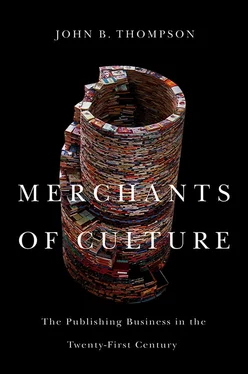While I have learned much from these and other accounts of the modern publishing industry, I have tried to do something which no one else has attempted. While the existing literature tends to be focused on the publishing industry in one country and most commonly the United States, I have sought to be international and comparative in my analysis, focusing on the field of English-language trade publishing which, by its very nature, is something more than American trade publishing and something less than book publishing, even trade book publishing, per se. I have sought to ground my analysis in a careful consideration of the facts and empirical trends but I have not restricted myself to a mere recitation of facts and figures. The account I offer is both analytical and normative: an attempt to lay bare the fundamental dynamic that has shaped the evolution of this field over the last few decades and, on the basis of this analysis, to offer a critical reflection on the consequences of these developments for our literary and intellectual culture. And I shall try to show that, when we grasp the logic of this field, we shall be able to make sense of those actions of agents and organizations within the field that might otherwise seem bizarre, including the actions of the organization that undertook to publish a small book by a hitherto largely unknown professor of computer science who happened to deliver an inspiring last lecture on realizing your childhood dreams.
1 1 See Pierre Bourdieu, The Field of Cultural Production: Essays on Art and Literature, ed. Randal Johnson (Cambridge: Polity, 1993); Pierre Bourdieu, ‘Some Properties of Fields’, in his Sociology in Question, tr. Richard Nice (London: Sage, 1993), pp. 72–7; Pierre Bourdieu, The Rules of Art: Genesis and Structure of the Literary Field, tr. Susan Emanuel (Cambridge: Polity, 1996).
2 2 This account is based on John B. Thompson, Books in the Digital Age: The Transformation of Academic and Higher Education Publishing in Britain and the United States (Cambridge: Polity, 2005), pp. 30–6. However, I’ve added social capital to the original scheme, since it became clear that this form of capital, important in all publishing fields, is particularly important in trade publishing, where networking is vital.
3 3 See Pierre Bourdieu, Language and Symbolic Power, ed. John B. Thompson (Cambridge: Polity, 1991); John B. Thompson, The Media and Modernity: A Social Theory of the Media (Cambridge: Polity, 1995), p. 16.
4 4 The very different logics of the fields of scholarly book publishing and higher education publishing are analysed in Thompson, Books in the Digital Age.
5 5 There are of course countries other than the United States and Britain within the international field of English-language publishing, including Australia, New Zealand, Canada and South Africa, and the dynamics of trade publishing in each of these countries have their own distinctive characteristics. However, the volume of output in the United States and Britain and the scale and geographical reach of their publishing industries mean that these two countries have long had a dominant role in the international field of English-language trade publishing.
6 6 On the rise of English as a global language, see David Crystal, English as a Global Language (Cambridge: Cambridge University Press, 1997). For further discussion of the global dominance of English and its implications for the shaping of publishing fields, see Thompson, Books in the Digital Age, pp. 41–3.
7 7 In 2002, around 215,000 new titles were published in the US and around 125,000 in the UK, compared to around 79,000 in Germany, around 70,000 in Spain and around 59,000 in France. (See tables 9 and 10 below for details on title output in the US and the UK. For details on title output in European countries, see Publishing Market Watch: Final Report, submitted to the European Commission (27 Jan. 2005), at http://ec.europa.eu/information_society/media_taskforce/doc/pmw_20050127.pdf) According to United Nations data, exports of printed books (excluding dictionaries and encyclopaedias) from the US in 2008 totalled $2.36 billion, and book exports (excluding dictionaries and encyclopaedias) from the UK totalled $2.15 billion; these figures were well ahead of Germany (total book exports of $1.5 billion), France ($791 million) and Spain ($755 million). Data available from http://data.un.org.
8 8 Analysing UNESCO data, Wischenbart found that more than half of all books translated globally are from English language originals, whereas only 6 per cent of translations go from all other languages into English; see Rüdiger Wischenbart, ‘The Many, Many Books – For Whom?’ (11 Sep. 2005), at www.wischenbart.com/de/essays__interviews_rw/wischenbart_publishing-diversity_oxford-2005.pdf. For a more detailed analysis of translations in Europe, see Rüdiger Wischenbart, Diversity Report 2008: An Overview and Analysis of Translation Statistics across Europe (21 Nov. 2008), at www.wischenbart.com/diversity/report/Diversity%20Report_prel-final_02.pdf. Further discussion of translations and bestseller lists in Europe and the Anglo-American world can be found in Miha Kovač, Never Mind the Web: Here Comes the Book (Oxford: Chandos, 2008), pp. 121–7.
9 9 The notion of the logic of the field is discussed in more detail in ch. 8.
10 10 The notion of publishers as gatekeepers of ideas is developed by Lewis A. Coser, Charles Kadushin and Walter W. Powell in Books: The Culture and Commerce of Publishing (New York: Basic Books, 1982), discussed further below.
11 11 The practice of allowing booksellers to return stock for full credit has a long history in Europe but was used rarely and half-heartedly by American publishers until the Great Depression of the 1930s, when publishers began experimenting seriously with returns policies as a way of stimulating sales and encouraging booksellers to increase stockholdings. In spring 1930, Putnam, Norton and Knopf all introduced schemes to allow booksellers to return stock for credit or exchange under certain conditions, and in 1932 Viking Press announced that orders for new books would be returnable for a credit of 90 per cent of the billed cost (see John Tebbel, A History of Book Publishing in the United States, vol. 3: The Golden Age between the Two Wars, 1920–1940 (New York: R. R. Bowker, 1978), pp. 429–30, 441). The practice of returns subsequently became a settled feature of the book trade and marks it out as somewhat unusual among retail sectors.
12 12 Coser et al., Books.
13 13 Thomas Whiteside, The Blockbuster Complex: Conglomerates, Show Business, and Book Publishing (Middletown, Conn.: Wesleyan University Press, 1980).
14 14 André Schiffrin, The Business of Books: How International Conglomerates Took Over Publishing and Changed the Way We Read (London: Verso, 2000); Jason Epstein, Book Business: Publishing Past Present and Future (New York: W. W. Norton, 2001).
1 THE GROWTH OF THE RETAIL CHAINS
The dramatic transformation of the retail landscape has been one of the key factors shaping the evolution of the field of English-language trade publishing since the 1960s. Throughout the first half of the twentieth century, bookselling in the United States and Britain was handled primarily by a plethora of small independent bookstores that were spread across the country, on the one hand, and a variety of non-book retailers like drugstores, department stores, newsagents and news-stands, on the other. 1 The bookstores tended to cater for an educated and cultivated clientele – the so-called ‘carriage trade’ – while the non-book retailers, who carried books along with many other commodities, tended to sell books to a wider range of the public. Department stores in the US began carrying books in the late nineteenth century. Macy’s of New York began selling books in 1869 and quickly became one of the largest booksellers in the country. 2 By 1951 it was estimated that department stores accounted for between 40 and 60 per cent of all retail trade book sales in the US. 3 Books were attractive for department stores to carry because they were regarded as prestigious, aspirational goods. They appealed to the cultivated tastes of well-to-do customers, adding an aura of seriousness and respectability to the store and attracting the kind of customer who had money to spend.
Читать дальше












